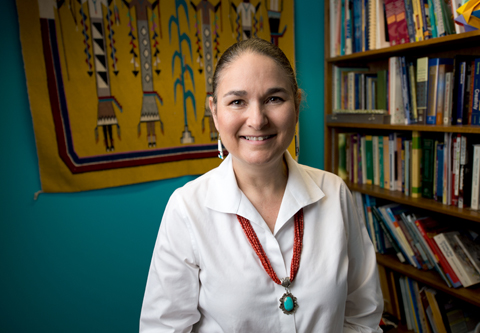Purdue Profiles: Marcia Gentry
September 23, 2014
 |
|
Marcia Gentry, director of Purdue's Gifted Education Resource Institute (GERI) and professor of educational studies. (Purdue University photo/John Underwood) |
Marcia Gentry has a simple philosophy: Every child has the right to learn something new every day, and gifted children are no exception.
It might be simple in theory, but creating and disseminating holistic pedagogy for gifted children is no easy task. As director of Purdue's Gifted Education Resource Institute (GERI) and professor of educational studies, Gentry pursues the complicated but vital mission of helping gifted children reach their potential. She also works tirelessly to bring gifted education to underserved populations.
What are some more details about GERI?
GERI was founded in the 1970s, and it is the oldest comprehensive center for gifted education in the country. We're also one of just a handful of such centers that are tied to master's and doctoral programs.
At Purdue, we offer graduate degrees and a teaching certificate in Gifted, Creative, and Talented Educational Studies. We have 14 doctoral students, who hail from across the globe, and they teach and work with educators and students through GERI.
GERI also offers three enrichment programs for gifted, creative and talented children during the summer. Two are commuter camps, and our Summer Residential Camp is a four-week program during which participants live on campus. Through our worldwide partnerships with other institutes and schools, we often bring in students from across the globe for this camp.
At our summer camps, attendees receive enrichment that they can't get in a traditional high-school setting. We offer a wide variety of courses tailored to specific age groups, including aviation, structural engineering, abnormal psychology, dystopian literature and much more.
What sort of research do you conduct?
Much of my research focuses on the idea of teaching all children as if they were gifted. Gifted education focuses on children's strengths, interests and talents as opposed to their weaknesses. It allows them to progress at a pace and depth that meets their abilities.
To this end, we study students' perceptions of school and how these perceptions affect their learning and motivation. We also determine methods of finding and nurturing gifted, creative and talented youth and creating effective programming for students and teachers. Further, the Total School Cluster Grouping Model is a model I developed and one that we are currently studying at GERI. TSCG focuses on meeting gifted students' needs as well as improving the teaching, learning and achievement of all students.
I also spend a considerable amount of time working to discover talent in children of underserved populations and in diverse cultures. Through the support of the Jack Kent Cooke Foundation, GERI has partnered with five Native American communities across the country to provide scholarships for high-ability students to attend our Summer Residential Camp. This year, we brought 74 students to the camp from four different reservations.
It's especially important to connect with Native American communities because these populations of students have been marginalized throughout history, and the students with whom we work live in poverty. Since they're a small population, they're almost invisible in national statistics and they're frequently ignored in educational research, meaning their gifted children's needs are not being addressed. I'm one-quarter Cherokee, so this issue is a personal one for me.
Why is it important for underserved populations to participate in gifted education?
It's important to fight for equity in gifted education because every gifted child, no matter his or her background, has a right to have his or her educational needs met.
Research shows that children from low-income families as well as those from culturally and linguistically diverse families are the least likely to be perceived as gifted, and yet we know that gifted children come from all backgrounds. So, it's important to make a special effort to identify and serve these children in gifted education programs. It's good for the kids and it's good for the country for everyone to reach his or her potential, and for everyone to lead productive lives as adults. To me, that's truly the heart of democracy.
What's a professional accomplishment that makes you proud?
I just found out that, in November, I will receive the National Association for Gifted Children's Distinguished Scholar Award. It's a huge honor, and what's more, one of our doctoral students and a Purdue alumnus also will receive prestigious awards from this organization.
These awards are exciting because Purdue is being honored holistically on the national level for its work in gifted studies. To me, Purdue truly is a wonderful place. For one, there's unbridled support here to focus on and be creative with my research. There's also incredible support for researchers at Purdue, from colleagues, staff and administrators within the college and across campus.
I feel like Purdue is where I belong; I love my job, the freedom I have here and the opportunity I have to work with outstanding colleagues and brilliant doctoral students.
Writer: Amanda Hamon Kunz, 49-61325, ahamon@purdue.edu

